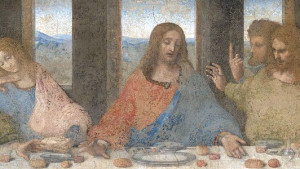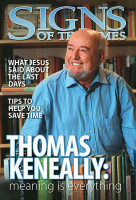Thomas Keneally is one of Australia's most highly acclaimed writers. The author of nearly 50 works of fiction, non-fiction, memoir and screenplay, his work has been recognised with numerous literary honours, including a Booker Prize and two Miles Franklin awards.
Of course, Keneally is best known for Schindler's Ark, the basis of the award-winning film Schindler's List, a story he stumbled across in an unlikely location.
“I met a Jewish [Holocaust] survivor in Beverly Hills, California, of all places, in 1980,” he recalls. “I bought a briefcase in a store whose owner was a Jewish survivor of the Holocaust.
He was a very impressive character in his own right. His name was Leopold; he was Polish. But he and his wife had been in Schindler's camp.”
He was immediately taken with the story and connects it with his Christian upbringing. “I think there are wonderful texts in the Scriptures that explain Schindler,” he says. “One of them is, ‘The Spirit breatheth where he will.' The Spirit doesn't always work through perfect channels. Schindler was certainly a highly imperfect channel. He was a black marketeer, he was an unsatisfactory husband. Yet it was through him that a certain ration of people, from the whole calamity of the Holocaust, was saved. That fascinates me, because writers are always interested in the paradox of the scoundrel saviour, the redeeming sinner.
Since my childhood I have always been interested in such characters. Literature has always been interested in them. “Oscar [Schindler] was an extraordinary case of a businessman on whose premises no Jewish prisoner died of unnatural causes—unnatural causes being starvation, execution, sabotage or brutalising by the SS. It seems to me that one of the problems Western civilisation has to get over, one of the tests that we have always failed, is our relationship with our fellow members of our species who happen to be Jewish.”
It is hardly surprising, then, that researching a story such as that of Schindler had a deep impact on him.
“We writers like to think that we can go in, plunder a story and get out cheap,” he reflects. “We grab the story but the story also grabs us. So I suffered a sort of depression about myself and about the human species, about halfway through the writing. I still remember that from about spring of 1981.
You don't get out with a clean skin at all.”
But he also admits to recognising the drama amid the tensions and tragedies of our world.
“Writers sometimes adopt superior moral airs and say, ‘I like to write about ethnic hatred because it's so terrible.' And it is terrible. But also it's where the drama is. It's always where the good stories are.
“Just imagine the drama now in, say, Sydney, of a relationship between a descendant of western Europeans and a Muslim,” he says. “Just imagine the tensions that generates. Love and fraternity across the lines of racist cultures and religions—that's always very interesting.
And it is astonishing how many times individual people find a way through those minefields. I think in doing so they are following the call to love, which is at the core of the Christianity in which I was raised as a kid.”
Not only was Keneally raised in a Catholic home, he studied for the priesthood in a Sydney seminary in the 1950s.
“There were always a number of kids in every [Catholic] school who studied for the priesthood,” he explains. “I studied for the priesthood but I found it very tough. I found not just the celibacy tough; I found the biggest tension between our individual reason and our obedience. And that has always been the big crisis for Christians, hasn't it?
“I found that the big Christian institutions run the danger of becoming like any big institution, whether it be the Red Cross or an insurance company or whatever. The great problem is that sometimes they will write people off whom they consider to have failed them. That is something I found very difficult to deal with. Some of my fellow students would either catch tuberculosis, or would become psychiatric cases under the stress of pursuing their vocation. And when these things happened, the church withdrew and left it all to the family. I felt then—and I still do—that the church has a responsibility to look after its own.”
But Keneally also had more philosophical objections to the form of Christianity he encountered. “The other great problem was of democracy,”
he says. “We all have the right to believe what we will believe, but there is the phenomenon of religious leaders in a number of groups saying, ‘Those who are not with us are among the unenlightened and may even be among the damned.' “But in a liberal democracy where everyone has the vote and everyone has human rights, who can say, without direct divine revelation, that anyone is damned? So there is an inevitable tension between democracy, with its many groups, its many races, its many religions, and some doctrine you encounter which says, ‘If you do not believe this set of beliefs and if you do not go through this set of observances you are among the damned.' That's the way I think about it anyhow.”
So what picture of God did Keneally develop in those days? “Well, it was male,” he explains. “It was rather Aryan, rather white Anglo- Saxon or Anglo-Celtic.
“But sometimes it's as if the God of the nice little-churches withdraws and you are left with God the unutterable, God the unspeakable, God the indefinable and I think it is quite possible that God evades all the nets of our definitions. Everything ineffable, whether it be love—whether romantic love or love for children— or whether it be an appreciation of the deity... . I love words and live by them, but there are some realities that slip through our web of words. Whatever God is, I don't think it is reduced to the Y and the X chromosome which defines who we are.”
And while Keneally admits he struggles with the words for God, he says he finds himself increasingly examining Jesus Christ. “What I find there is a model for life,” he says. “There is no question that he thought he was the Son of God, but let's abstract from that if you will permit me for a moment.
“There are wonderful enduring aphorisms such as, ‘Don't get yourself all in a lather, your Father knows if one sparrow falls from heaven.' ‘If you would be my disciple, give all you have to the poor and come follow me,'” Keneally quotes. “There are many texts that I find, as I get to be an old inheritor of the King James Bible, that I find very comforting.
“And, of course, above all there is that great statement of St Paul, that you can do everything—win an Aussie Rules or Rugby League grand final, win gold medals, whatever—but if you have not love, you are as ‘sounding brass and tinkling cymbals.' “And I still follow the proposition in my daily life that if you ‘do this to the least of my brethren, you do it to me.' Sometimes you look at politicians and you wonder how they can hear that read aloud in the churches they attend and still pursue some of the policies they do.”
And without a doubt some of these reflections, realities and realisations inform Thomas Keneally in his chosen career as a novelist. “I still think of it—rightly or wrongly—as the biggest game for the human species to play.
The business of trying to tell a story, of trying to bring the elements together, to create an engaging, an engrossing, an enlightening tale,” he says. “It's partly ego, there is no denying that. But there have always been people who wanted to tell stories around the campsite. It's one of our ancient descriptions; we are a species that tells stories.
“From the time when I was a kid I was very impressed with the priesthood, the mystery of the priesthood, the sacraments and all the rest of it. But I also thought there is this great bag of tricks that the novelist has, and I would love to try to deploy them. I had no idea how difficult it was, and I had no idea that, at 71, I'd still be struggling toward producing a good final story on the back of which I could then say, ‘Nunc dimittis: Lord, now lettest thou thy servant depart in peace.' “I had a friend named Morris West who lived near me and died in his 80s at the end of a very good paragraph. He was still struggling to write the good book, and I think I will be doing that till the end of my days. A lifetime is barely enough for the task we face and all the possibilities of the human soul.”
For Keneally, it is obvious his life works are focused on the human quest for meaning. “There is no question that there is a similarity between where I began and where I've ended up,” he says. “I would not even want to deny that it is so.
“Meaning is everything and humans will never cease pursuing the question of meaning. Nor should they. Indeed, nor can they. We're almost hard-wired to pursue the questions of meaning and significance.
There is no escaping it, wherever you go.”
Adapted, with permission, from Open House: Sheridan Voysey in Conversation (Strand Publishing, 2008), www.theopenhouse.net.au.






